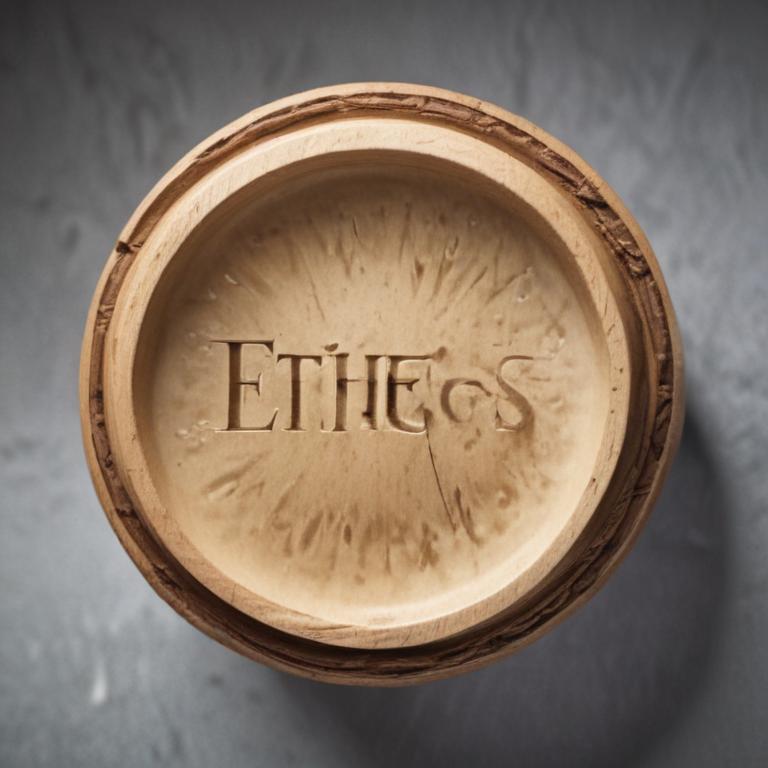发音 (Pronunciation):
IPA: /ˈɛθɪks/
中文近似: 艾-thi-ks
中文意思与词性 (Meanings & Part of Speech):
- 伦理学,道德规范 (n.)
- 道德准则 (n.)
例句 (Examples):
1. She studied ethics at university.
(她在大学学习了伦理学。)
2. Business ethics are important for any company.
(商业道德对任何公司都很重要。)
用法提示 (Usage Tip):
ethics 通常指一套系统的道德原则或学科,属于不可数名词。与 ethic(道德准则,常用作可数名词)区别:ethics 更强调整体性理论或规范,而 ethic 指具体的道德标准。
更多关于 "ethics" (More about "ethics")
单词来源 (Etymology)
“ethics”来自希腊语“ethos”,意思是“习惯、性格”,后来演变为“品德、道德”,在18世纪成为道德哲学的专有名词。
词根词缀解析 (Root & Affix Analysis)
词根 eth- 相关于“习惯、品德”,ics 为名词后缀,表示某种学科或知识领域。
“ethics”的字母与词根个性化解读
字母象形/引申义 (个性化参考)
- 字母 'e' 的象形或引申含义可能包括: 眼睛 (窗户符号引申); 向外 (ex-变体); 元音互换: A=E=I=O=U=W=Y。
- 字母 't' 的象形或引申含义可能包括: 顶端 -> 记号/标志; 手杖 -> 抓 -> 手 -> 伸展 -> 指示代词; 支撑 -> 站立; 三叉 -> Tr转换/转; 分叉; 音变: T=D=S=TH。
- 字母 'h' 的象形或引申含义可能包括: 梯子 (象形) -> 高, 大; 手 (hand, hold); 房子 -> 隐藏; 拟声 (送气音 哈气); 音变: H=G=K=C, H易脱落。
- 字母 'i' 的象形或引申含义可能包括: 我 (an, any, one -> 人); 水滴 -> 水 (ice); 尖, 一点, 小 (inch); 元音互换: A=E=I=O=U=W=Y。
- 字母 'c' 的象形或引申含义可能包括: 骆驼头 (象形) -> 运输 (car); 抓 (手型); 砍 (弯刀); 包围 (形状); 合并; 叫喊 (嘴型); 走/动; 音变: C=G=K=S。
- 字母 's' 的象形或引申含义可能包括: 水波纹/走路痕迹 (S象形); 吐气轻细咝 -> 说话 (拟声); 音变: S=C=Z=TH=X。
学习提示:以上针对单词 ethics 的字母和词根解读,主要基于提供的特定象形及词根资料。这些提示旨在启发联想,而非绝对定论。更通用的记忆规则和原则请参考首页。英语词源复杂多变,实际应用中请结合更全面的词源词典和语言学知识进行深入学习。
常用词组 (Common Phrases)
- medical ethics: 医学伦理
- code of ethics: 道德准则
其他语言 (Other Languages)
- 德语: Ethik
- 法语: éthique
字母整体创意联想
ethics 这个单词前半部分 ethi 与“义气”的“义”谐音,提醒我们与道德正义有关,结尾的 s 像一条蜿蜒的道德线,贯穿始终。
逐字母创意解读
中文谐音助记
“ethics” 谐音“艾思课思”——爱的思考,课上思考道德,就是伦理学。
相关电影/名言
"Ethics is knowing the difference between what you have a right to do and what is right to do."
(伦理是知道你有权做什么和什么是正确去做之间的区别。)
- 《波特曼报告》(The Porter Report, 2002)
趣味知识/故事
在古希腊,苏格拉底经常被认为是伦理学的奠基人。他提出“知善行善”理念,认为了解道德本质才能真正做到品行端正。现代伦理学在医学、商界等领域都有独立应用规范,例如医生的“希波克拉底誓言”就是医学伦理的具体体现。
拓展信息
ethics 除了是伦理学、道德规范的意思之外,经常用于讨论某个领域的道德规范,比如商业伦理(business ethics)、环境伦理(environmental ethics)等。
需要注意的是,ethics 一般不用作复数,而 ethic 可以作为具体的某条道德标准来使用。
在正式场合和学术写作中,ethics 是很常见的抽象名词,用于高层次的道德讨论。
网络参考 (More about "ethics" from the Web)
Ethics | Definition, History, Examples, Types, Philosophy, & Facts ...
Ethics, the philosophical discipline concerned with what is morally good and bad and morally right and wrong. Its subject consists of fundamental issues of practical decision making, and its major concerns include the nature of ultimate value and the standards by which human actions can be morally evaluated.
Ethics - Wikipedia
Ethics is the philosophical study of moral phenomena. Also called moral philosophy, it investigates normative questions about what people ought to do or which behavior is morally right. Its main branches include normative ethics, applied ethics, and metaethics.. Normative ethics aims to find general principles that govern how people should act. Applied ethics examines concrete ethical problems ...
ETHIC Definition & Meaning - Merriam-Webster
Learn the meaning of ethic, a set of moral principles or values, and how it differs from morals. See synonyms, examples, word history, and related phrases of ethic.
更多图片 (ethics More Images)

